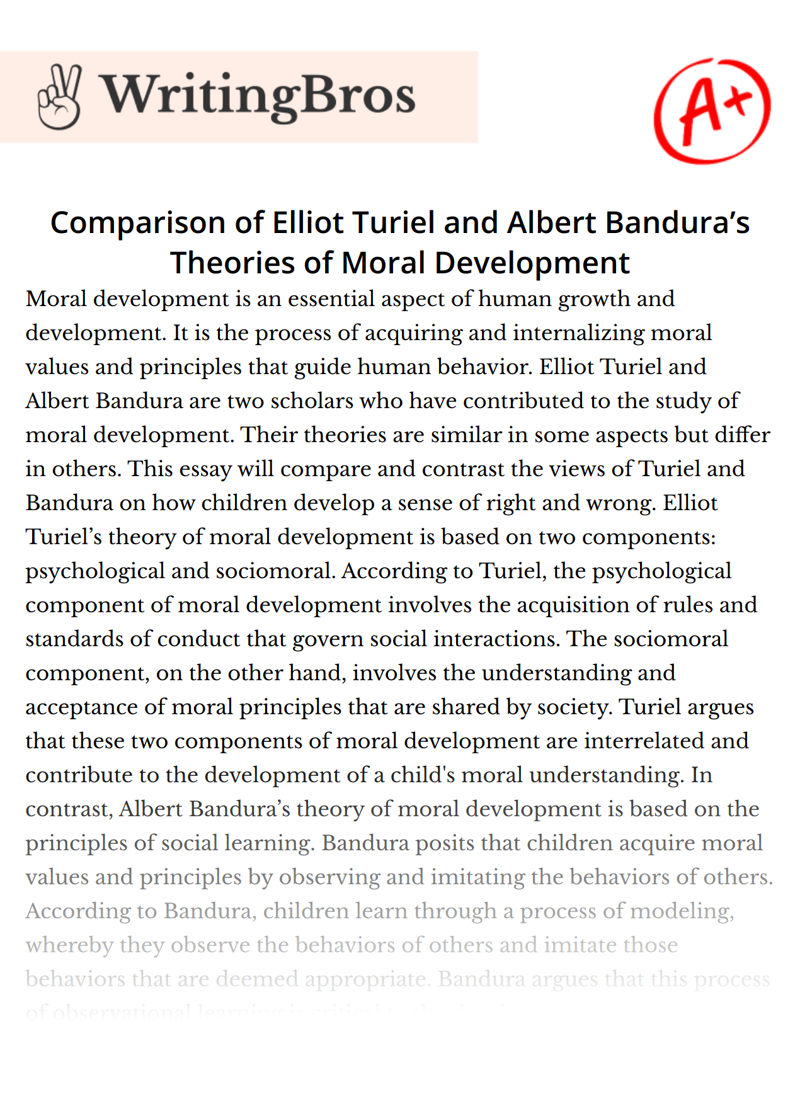Comparison of Elliot Turiel and Albert Bandura’s Theories of Moral Development

Moral development is an essential aspect of human growth and development. It is the process of acquiring and internalizing moral values and principles that guide human behavior. Elliot Turiel and Albert Bandura are two scholars who have contributed to the study of moral development. Their theories are similar in some aspects but differ in others. This essay will compare and contrast the views of Turiel and Bandura on how children develop a sense of right and wrong.
Elliot Turiel’s theory of moral development is based on two components: psychological and sociomoral. According to Turiel, the psychological component of moral development involves the acquisition of rules and standards of conduct that govern social interactions. The sociomoral component, on the other hand, involves the understanding and acceptance of moral principles that are shared by society. Turiel argues that these two components of moral development are interrelated and contribute to the development of a child's moral understanding.
In contrast, Albert Bandura’s theory of moral development is based on the principles of social learning. Bandura posits that children acquire moral values and principles by observing and imitating the behaviors of others. According to Bandura, children learn through a process of modeling, whereby they observe the behaviors of others and imitate those behaviors that are deemed appropriate. Bandura argues that this process of observational learning is critical to the development of a child's moral understanding.
Despite their differences, Turiel and Bandura’s theories share some similarities. One similarity is that both scholars believe that moral development begins at a young age. Turiel argues that children begin to develop an understanding of social rules and standards of conduct as early as two years of age. Similarly, Bandura posits that children can learn from models at a very young age. He argues that children as young as six months old can perform behaviors displayed by models.
Another similarity between Turiel and Bandura’s theories is that both scholars emphasize the importance of socialization in moral development. Turiel argues that the acquisition of moral standards and principles is influenced by socialization. Similarly, Bandura posits that socialization plays a critical role in shaping a child's moral understanding. Bandura argues that children learn through the process of modeling, which is a form of socialization.
Despite these similarities, Turiel and Bandura’s theories also differ in some aspects. Turiel’s theory is based on the belief that children's moral development is influenced by both internal and external factors. Turiel argues that the psychological and sociomoral components of moral development are interrelated and contribute to the development of a child's moral understanding. In contrast, Bandura’s theory is primarily based on the principle of social learning. He argues that children learn by observing and imitating the behaviors of others.
Another difference between Turiel and Bandura’s theories is that Turiel’s theory emphasizes the role of culture in moral development, while Bandura’s theory does not. Turiel argues that the sociomoral component of moral development is influenced by cultural norms and values. He posits that the acquisition of moral principles is shaped by cultural beliefs and practices. In contrast, Bandura’s theory emphasizes the role of modeling in moral development, and culture is not explicitly mentioned.
In conclusion, the study of moral development is critical in understanding human behavior. Elliot Turiel and Albert Bandura are two scholars who have contributed to the study of moral development. Although their theories share some similarities, they differ in some aspects. Turiel’s theory emphasizes the importance of both internal and external factors in moral development and the role of culture in shaping moral principles. In contrast, Bandura’s theory is primarily based on observational learning.
Overall, Turiel and Bandura's theories offer valuable perspectives on how children develop a sense of right and wrong. Educators can use these theories to inform their teaching practices and help children develop a strong moral foundation that will serve them well throughout their lives.
References
- Bandura, A. (1977). Social learning theory. Englewood Cliffs, NJ: Prentice-Hall.
- Bandura, A. (1986). Social foundations of thought and action: A social cognitive theory. Englewood Cliffs, NJ: Prentice-Hall.
- Bandura, A. (1997). Self-efficacy: The exercise of control. New York: W.H. Freeman.
- Turiel, E. (1983). The development of social knowledge: Morality and convention. Cambridge: Cambridge University Press.
- Turiel, E. (2002). The culture of morality: Social development, context, and conflict. Cambridge: Cambridge University Press.
- Turiel, E. (2006). Thought, emotions, and social interactional processes in moral development. In M. Killen & J. Smetana (Eds.), Handbook of moral development (pp. 81-112). Mahwah, NJ: Erlbaum.
- Turiel, E. (2008). The development of morality. In W. Damon & R. Lerner (Eds.), Handbook of child psychology: Vol. 3. Social, emotional, and personality development (6th ed., pp. 789-857). Hoboken, NJ: Wiley.
- Turiel, E., & Smetana, J. G. (Eds.). (2015). Handbook of moral development (2nd ed.). New York: Psychology Press.
Cite this Essay
To export a reference to this article please select a referencing style below

